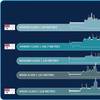Shipping accountant Moore Stephens says draft proposals on the new U.K. tonnage tax regime lack the flexibility shipowners need for timing acquisitions and sales of ships. It also warns that the draft legislation contains a very broad anti-avoidance clause that could cause companies to unintentionally breach the detailed rules of the tonnage tax scheme. Balancing charges will not crystallize on entry. However, they may arise when vessels are sold, although they will be phased out. "The new rules on the deferment of balancing charges appear to be harsher than the existing regime," says Sue Bill, shipping tax manager at Moore Stephens. "Shipowners will have only one year before and two after the sale of a ship as a period of grace for deferring balancing charges, as opposed to six years now. They will have to be very careful over the timing of both purchases and sales of ships, which means the tax rules hamper their market flexibility."
The proposed anti-avoidance clause allows the Inland Revenue to eject shipowners from the scheme -triggering exit charges - for wide and loosely defined abuses of the rules, even if unintentional. Bill warned that other aspects of the proposed new rules have not yet been released. "It is not yet clear to what extent capital allowances will be available on expenditure on new ships during a period in the scheme if owners leave the scheme," she says. "The rules have to be clear and allow flexibility if British shipping is to benefit."
However, Bill welcomed proposed arrangements for capital allowances for lease finance deals. "The limits have been set at a more realistic level than the originally proposed £20m. There is now a phased allowance up to £80m," says Bill.
Moore Stephens was commenting on proposed draft clauses for the Finance Bill, released by the Inland Revenue on December 23. The Bill will be laid before parliament in April 2000, and brought into effect in August 2000, to implement the tonnage tax system announced last year. Shipowners can apply to opt in to the regime for accounting periods beginning on or after January 1, 2000.
Sponsored Content
The Future of the Advanced Measurement Industry: A Vision of Precision, Safety, and Reliability

August 2025
 Read the Magazine
Read the Magazine

 Read the Magazine
Read the Magazine
This issue sponsored by:

Corn Belt Ports: Connecting America’s Heartland to Global Markets
Subscribe for
Maritime Reporter E-News
Maritime Reporter E-News is the maritime industry's largest circulation and most authoritative ENews Service, delivered to your Email five times per week








